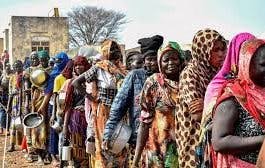In launching its humanitarian appeal Monday, the U.N. warned that conflicts, climate emergencies and collapsing economies are wreaking havoc in vulnerable communities around the world, resulting in “catastrophic hunger, massive displacement, and disease outbreaks.”
Despite the devastating toll taken by these multiple overlapping emergencies on the lives of hundreds of millions of people, “the necessary support from the international community is not keeping pace with needs,” said Martin Griffiths, under-secretary-general for humanitarian affairs and emergency relief coordinator.
While 300 million people need humanitarian assistance and protection, he noted that lack of money has forced the U.N. to drastically scale down its global humanitarian operations and target aid to fewer of the most destitute people.
“Against the backdrop of a severe and ominous funding crisis,” Griffiths said the U.N. was asking for $10 billion less than last year’s humanitarian appeal for $56.7 billion, noting that only $20 billion, just over one-third of the amount needed for 2023, had been received.
“If we cannot provide more help in 2024, people will pay for it with their lives,” he said.
The U.N. emergency chief cited the Palestinian people and Gaza, Sudan and Sudan westward as the places of greatest need, adding that the crisis in Gaza is likely to divert attention from other areas of great need.
“I think the ones that are being forgotten are parts of Africa, which have traditionally been in the front of our attention,” he said. “Even Ukraine now has difficulty getting on the news. It is becoming more and more difficult to get attention.”
He said, “It is becoming like a hit parade of where the worst place is now” to get the world’s attention.
The consequences of being marginalized by so-called more newsworthy cases are tragic.
For example, the United Nations reports in Afghanistan, 10 million people lost food assistance between May and November; in Myanmar, more than half a million people are living in inadequate living conditions; in Yemen, more than 80% of those in dire straits do not have proper water and sanitation; and in Nigeria, only 2% of women needing sexual and reproductive health services and gender-based violence prevention are receiving it.
While armed conflict remains a leading cause of death, disaster and misery, humanitarians attending the launch of the U.N.’s global humanitarian appeal viewed the global climate emergency as the driving force behind displacement and world hunger.
Attending a high-level panel discussion on humanitarian action in the context of the climate crisis, Joyce Msuya, assistant secretary-general for humanitarian affairs, warned that human activity had “pushed the planet into an age of fire, heat, floods and drought unlike any humans have faced.”
So far this year, she said climate and weather-related disasters have affected more than 44 million people, causing more than 18,000 deaths.
“The climate crisis also is turbocharging the world’s existing humanitarian crises, plunging people already reeling from disaster into even greater depth of misery,” she said.
Another panelist warned that climate change “was throwing fuel on the embers of crises all over the world.”
Kelly Clements, U.N. deputy high commissioner for refugees, said that drought, floods and other natural disasters have forcibly displaced 114 million people.
“Right now, about two-thirds of forcibly displaced people are in climate vulnerable areas. These also are areas where the overlap with conflict becomes most acute,” she said.
Amadou Seyni, of the International Migrant Women’s Solidarity Association in Turkey, noted that in Niger, 80% of the population, mainly women, depend upon agriculture.
“The effects of climate change now represent a major threat to economic development and a source of conflict,” she said.
In winding up the day’s launch, U.N. emergency chief Griffiths paid tribute to humanitarians. He said they are “saving lives, fighting hunger, protecting children, pushing back epidemics and providing shelter and sanitation in many or the world’s most inhumane contexts.”
Unfortunately, he said many people in urgent need did not receive aid because the hoped-for support did not materialize.
“Throughout the year, humanitarian agencies had to make increasingly painful decisions, including cutting life-saving food, water, and health programming,” he said. “And we would like, we would hope, not to continue this trend into next year.”
